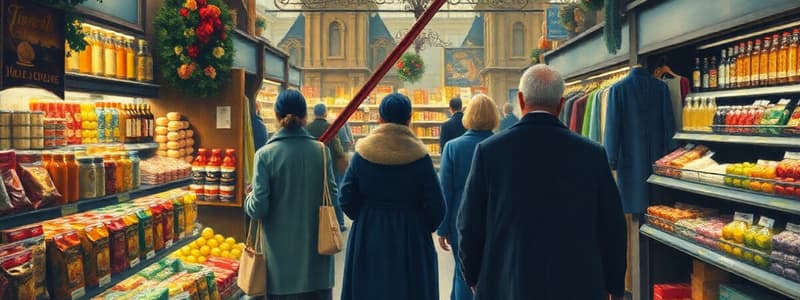Podcast
Questions and Answers
What is the primary advantage that supermarkets have over independent retailers?
What is the primary advantage that supermarkets have over independent retailers?
- They can buy in bulk, reducing costs. (correct)
- They are usually located in city centers.
- They offer a wider variety of products.
- They provide more personalized customer service.
Which type of retailer tends to provide specialized services like repair and delivery?
Which type of retailer tends to provide specialized services like repair and delivery?
- Chain stores
- Department stores
- Independent retailers (correct)
- Supermarkets
What is a characteristic feature of department stores?
What is a characteristic feature of department stores?
- They are exclusively located in suburbs.
- They usually sell groceries only.
- They are divided into distinct selling departments. (correct)
- They primarily focus on low-cost items.
Which statement best describes the location of supermarkets?
Which statement best describes the location of supermarkets?
What distinguishes multiples or chain stores from other types of retailers?
What distinguishes multiples or chain stores from other types of retailers?
What is a significant characteristic of chain stores in terms of staff motivation?
What is a significant characteristic of chain stores in terms of staff motivation?
Which of the following best describes hypermarkets?
Which of the following best describes hypermarkets?
What is a common trait of kiosks and street vendors?
What is a common trait of kiosks and street vendors?
What aspect differentiates market traders from chain stores?
What aspect differentiates market traders from chain stores?
What is the primary advantage that chain stores have in terms of pricing?
What is the primary advantage that chain stores have in terms of pricing?
Flashcards
Bulk Breaking
Bulk Breaking
Retailers buy large quantities from manufacturers and wholesalers and sell small quantities to customers. This is called bulk breaking.
Convenience for Customers
Convenience for Customers
Retailers operate in locations that are convenient for customers, often with features like good parking.
Value-Added Services
Value-Added Services
Retailers may enhance the value of products by offering services like packing, delivery, repair, product information, guarantees, and gift wrapping.
Chain Stores
Chain Stores
Signup and view all the flashcards
Department Stores
Department Stores
Signup and view all the flashcards
Hypermarkets
Hypermarkets
Signup and view all the flashcards
Kiosks and Street Vendors
Kiosks and Street Vendors
Signup and view all the flashcards
Market Traders
Market Traders
Signup and view all the flashcards
Online Retailers
Online Retailers
Signup and view all the flashcards
Study Notes
Retailing
- Retailers buy in bulk from manufacturers or wholesalers and sell smaller quantities to customers.
- Convenient locations and facilities (e.g., parking) are important for retailers.
- Retailers may add value by providing services like packing, delivery, or repair.
- Businesses can choose from various retailer types.
Independent Retailers
- These are typically smaller businesses.
- Examples include newsagents, greengrocers, and specialists (e.g., bike shops).
- They can be found in various locations (high streets, shopping centers, small villages, towns).
Supermarkets
- Large stores (can sell up to 20,000 product lines).
- This includes groceries, fresh food, household goods, etc.
- Often located on the outskirts of towns/cities for cheaper land.
- Offer "one-stop shopping" with convenient parking.
- Can afford lower prices due to bulk purchasing.
Department Stores
- Large stores divided into departments (e.g., menswear, cosmetics).
- Aim for high-quality products and excellent customer service.
- Sales staff trained in their respective departments.
- Often located in city centers (e.g., Harrods in London).
Multiple/Chain Stores
- Multiple stores owned by one business.
- Each store follows a standardized layout, pricing, and product range.
- Centralized office manages the stores across multiple locations.
- Standardized staff training, wages, and working conditions.
Superstores/Hypermarkets
- Very large stores offering a wide range of products.
- Located on the outskirts of towns.
- May feel like warehouses with limited customer service.
- Cheaper than supermarkets with a broader product range.
Kiosks and Street Vendors
- Small outlets with a limited range of goods (e.g., fast food, newspapers).
- Often found in airports, stations, and streets.
- Low set-up costs and minimal overheads (variable depending on location).
Market Traders
- Small businesses that sell goods from market stalls.
- Low overheads and usually cheaper than other retailers.
- Often relocate from one market to another.
Online Retailers
- Businesses selling products online (e.g., Amazon).
- Purchase goods from manufacturers and sell them to customers.
Studying That Suits You
Use AI to generate personalized quizzes and flashcards to suit your learning preferences.




